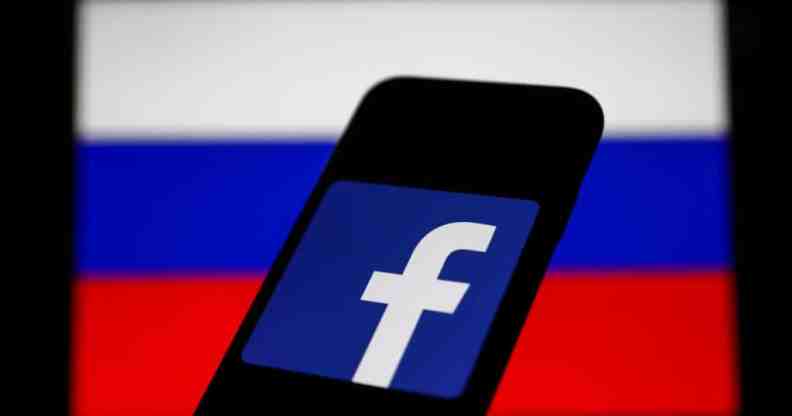Russia fines Facebook, Instagram and TikTok under chilling ‘LGBT+ propaganda’ law

Russia is going after Facebook. (Getty)
Two of Russia’s top courts have fined TikTok and Facebook parent company Meta for so-called “LGBT+ propaganda”.
The Magistrate Court of the Taganka district in Moscow fined Meta, which also owns Instagram, 4 million rubles (£42,900) for refusing to take down content “propagating the LGBT+ community”.
A second ruling slapped TikTok, owned by ByteDancem, a 2 million rubles (£21,400) for a similar offence under a 2013 Russian law that prohibits the “propaganda” of LGBT+ identities to minors.
Moscow’s Mirovoi court fined Tiktok for not complying with the country’s powerful and oppressive internet and communications regulator’s request to remove content “propagating homosexual relations”, according to a report from Agence France Presse (AFP).
Such fines are becoming familiar occurrences in Russia, where the regulator, known as the Roskomnadzor, has piled pressure on social media platforms that fail to fall in line with the Kremlin.
Amid the Russo-Ukraine War, the Roskomnadzor had upped its demands that Silicon Valley companies censor content that it deems illegal, including pro-LGBT+ posts.
If companies decline to comply, the Roskomnadzor warns that they will face heavy fines as well as access to their services being limited.
Facebook, Instagram and Twitter has already been blocked across the country for placing restrictions on Russian state-owned media outlets.
Meta had already been dubbed an “extremist organisation” in a March ruling at the Tverskoy Court in Moscow.
The Prosecutor’s General Office took aim at Meta for permitting “Russophobia” and compared the company to ISIS.
The vague ruling opened up a worrisome scenario for ordinary Russians – by simply using a Meta product, such as Facebook, they could be considered a member of an extremist organisation – a crime punishable with up to six years in prison.
Aleksandr Voronov, CEO of the Russian LGBT+ group Coming Out, told PinkNews that the Russian state once again taking aim at LGBT+ no longer surprises him.
“I can only guess, of course, what was inside the heads of judges who made these court decisions,” he said.
“As I see it looks like a continuation of a process of looking for enemies and some kind of ‘legitimation’ of previous decisions made by Russian authorities.
“There is a Russian proverb: ‘Who is not with us that one is against us’.
“Meta refused to delete anti-war materials and to moderate anti-Russian content, so obviously they are enemies of the Russian State. That’s why they were labelled as ‘extremists’.”
“But that’s not enough to declare – it’s better to remind sometimes why exactly they are enemies.”
Social media websites are not the only targets on the Roskomnadzor’s radar.
The Roskomnadzor had wielded Russia’s “gay propaganda law” to compel organisations to back down from showing support for LGBT+ lives, battering queer filmmakers, HIV health services and even children’s book publishers.
A television channel that aired a showed award ceremony featuring guests wearing gender-flipping outfits was also fined for “gay propaganda”.
Video games, sporting events, and more have been constrained by the “gay propaganda law”. The effects of the censorship extend far beyond not being able to access social media – human rights experts have warned that the law has stoked a culture of fear, hostility and brutality towards queer Russians.
“It’s quite scary that the state chooses a theme of LGBT propaganda as a reminder,” Voronov added.

